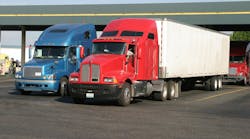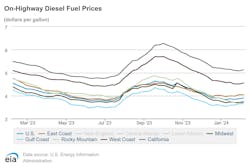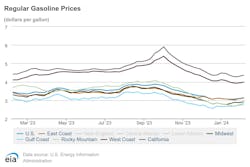Both gasoline and on-highway diesel fuel prices are beginning to heat up as the weather warms. The week of Feb. 5, the U.S. Energy Information Administration logged a national diesel price average of $3.899 per gallon, 3 cents higher than last week.
Most regions in the U.S. followed suit with incremental price increases from last week, save for the Lower Atlantic sub-region, which saw a price drop of 2 cents to $3.929, and the East Coast region, which experienced no change in on-highway diesel prices at all and remained at $4.043 per gallon.
While diesel prices across the country are still lower than they were last year, most saw price hikes of 3-5 cents this week. The Rocky Mountain region raised its diesel prices the least, only half a cent, to $3.650, with the New England sub-region and the Midwest each increasing only 3 cents. The Gulf Coast, on the other hand, saw its diesel prices rise by 5 cents to an overall cost of $3.702 per gallon, while the West Coast, both with and without California (and California itself), all saw price increases of 4 cents.
With these changes in diesel costs, the Rocky Mountain region is currently the least expensive place to buy gas by 5 cents, while California is still the most expensive.
See also: Diesel prices up a tick; down 75 cents from January ’23
In comparison, the AAA motor club logged nationwide diesel prices at $3.932 per gallon, 4 cents more than the EIA and 3 cents more than last week’s average of $3.906. However, this average is still much cheaper than last year’s average of $4.639 per gallon.
Gasoline prices up to $3.136 per gallon
Similar to on-highway diesel prices, the EIA found that gasoline prices are up across the nation. The national average is $3.136, 4 cents higher than a week ago but cheaper than a year ago by 30 cents.
On a more granular level, gasoline prices rose roughly 1-7 cents, with the most significant price hike in California pushing gas prices up to $4.366, while the second-largest price hike of 6 cents in the Gulf Coast raised gas prices per gallon to $2.821.
Meanwhile, the Central Atlantic sub-region, Rocky Mountain region, and the West Coast without California all saw a price increase of only 1 cent. With these numbers, the Rocky Mountain region is the cheapest place for both diesel and gasoline fuel at $2.746 per gallon, while California is the most expensive at $4.366.
The AAA motor club logged almost identical gas prices as the EIA. As of Feb. 5, the AAA pinned gas costs $3.148 per gallon, which is 4 cents more expensive than last week but 32 cents better than last year. According to a press release from the organization, the price increases could be due to normal seasonal demand and the rise in oil costs, which currently sit in the $70s per barrel.
“We are in that time of year where pump prices begin to heat up, usually peaking around July,” said Andrew Gross, AAA spokesperson. “But unless something shocks the global oil market and causes prices to spike, the national average for a gallon of gas will probably stagger higher, with some flat days or even small price dips along the way.”





